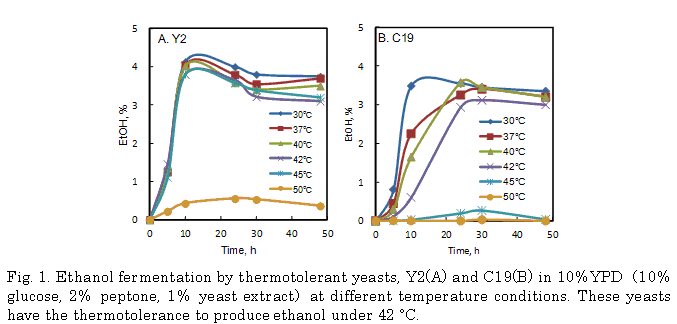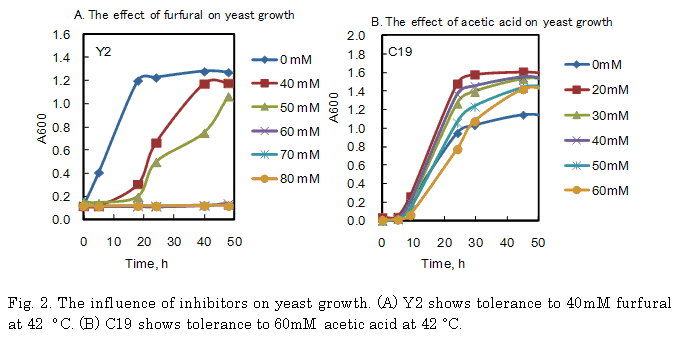Isolation of thermotolerant yeasts for a non-cooling fermentation system in tropical areas
Description
Ambient temperatures in tropical areas are high, therefore ethanol fermenters also show a rise in temperature (up to around 40 ºC) during fermentation. Saccharomyces cerevisiae, the typical fermenting yeast, cannot carry out fermentation under high temperatures because it does not have thermotolerance.
We isolated the thermotolerant yeasts, Kluyveromyces marxianus (Y2) and Issatochenkia orientalis (C19). These yeasts, which have shown greater thermotolerance than S. cerevisiae, can produce ethanol under high temperature conditions (more than 40 ºC) and can tolerate the fermentation inhibitors contained in saccharified lignocellulosic biomass. Consequently, ethanol fermentation without cooling can be achieved using these yeasts. It is expected to save energy through reduced cooling costs.
These thermotolerant yeasts can grow at higher temperatures than S. cerevisiae. Y2 and C19 strains can grow and ferment at 45 ºC and 42 ºC, respectively (Figs.1A and B). Y2 strain has shown tolerance to furfural, a fural compound, and is relatively insulated from the inhibition by the furfural induced from biomass hydrolysis (Fig. 2A); C19 strain has displayed tolerance to weak acids, hence it is relatively insulated from the inhibition by acetic acid induced from hydrolysis of lignocellulose biomass (Fig. 2B). The kinds of inhibitors to fermentation depend on the type of lignocellulose, therefore, we can select these yeasts as adequate for fermentation in biomass hydrolysis.
In terms of productivity, it can be pointed out that ethanol yield of C19 (73%) is lower than that of Y2 (90%). Additionally, Y2 often produces glycerol as a byproduct when it is incubated under stress conditions.
Figure, table
- Affiliation
-
Japan International Research Center for Agricultural Sciences Biological Resources and Post-harvest Division
- Classification
-
Research B
- Research project
- Program name
- Term of research
-
FY 2012 (FY 2011-FY 2015)
- Responsible researcher
-
Murata Yoshinori ( Biological Resources and Post-harvest Division )
Arai Takamitsu ( Biological Resources and Post-harvest Division )
MIERUKA ID: 001768Kosugi Akihiko ( Biological Resources and Post-harvest Division )
Mori Takashi ( Biological Resources and Post-harvest Division )
- ほか
- Publication, etc.
-
Y.Mori et al, (2010)Journal of the Japan Institute of Energy 89, 1147-1152
- Japanese PDF
-
2012_21_A4_ja.pdf112.66 KB
- English PDF
-
2012_21_A4_en.pdf343.58 KB


